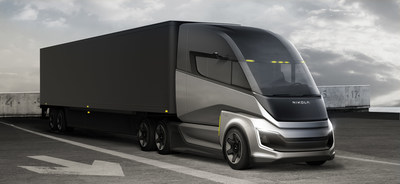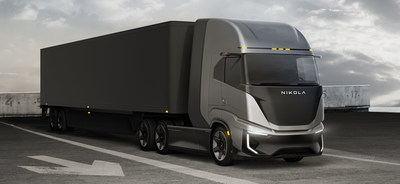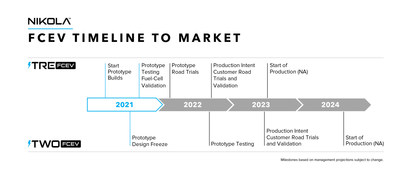Nikola Details North American Fuel-Cell Vehicle Program
Nikola Corporation (NASDAQ: NKLA) has unveiled its plans for a North American hydrogen fuel-cell electric vehicle (FCEV) commercial truck program. This initiative follows the production launch of its Tre battery-electric vehicle. Key models include the Nikola Tre FCEV Cabover, targeting up to 500 miles, and the Nikola Two FCEV Sleeper, with a range of up to 900 miles, expected to launch in late 2024. Production for the Tre FCEV prototypes begins in Q2 2021, with full production set for late 2023. The company aims to lead the market in sustainable commercial transport solutions.
- Launch of North American hydrogen fuel-cell electric vehicle program.
- Introduction of Nikola Two FCEV Sleeper with a range of up to 900 miles.
- First Tre FCEV prototype production scheduled in Q2 2021.
- Tre FCEV expected to meet regional market demands for quick fueling.
- Production for Tre FCEV not set to commence until second half of 2023, leading to potential delays.
Insights
Analyzing...
PHOENIX, Feb. 23, 2021 /PRNewswire/ -- Nikola Corporation (NASDAQ: NKLA), a global leader in zero-emissions transportation and infrastructure solutions, announced today details about its North American hydrogen fuel-cell electric vehicle (FCEV) commercial truck program.
Following the launch of North American production of the Tre battery-electric vehicle (BEV), Nikola plans to introduce a FCEV variant of the Nikola Tre Cabover, and the long-range Nikola Two FCEV Sleeper targeting best-in-class efficiency for ranges between 300-900 miles in the North American market.
"To expedite the transition to a carbon-free future, the trucking industry needs heavy-duty, zero-emission commercial vehicles engineered to match the weight and range capabilities of today's diesel trucks. Nikola is excited to introduce additional detail about our portfolio of FCEV trucks and our continued commitment to sustainable commercial transportation," said Nikola's Global Head of FCEV Jason Roycht.
The Nikola portfolio includes trucks for the entire spectrum of commercial freight:
- Metro/Regional—Nikola Tre BEV Cabover for trips up to 300 miles
- Regional—Nikola Tre FCEV for longer-range needs of up to 500 miles and for fast fueling/quick turnaround needs
- Long-Haul—Nikola Two FCEV Sleeper for longest-range missions up to 900 miles
NIKOLA TRE FCEV CABOVER
The Nikola Tre FCEV Cabover is targeted for distances up to 500 miles, and is expected to address the majority of the North American regional market, especially use cases where additional freight hauling capacity and quick fueling are required by fleet operators.
The Tre FCEV leverages the Tre BEV platform with hydrogen fuel-cell power, while being designed to improve aerodynamics and reduce total vehicle weight.
The first Tre FCEV prototype builds are scheduled to begin in Arizona and Ulm, Germany in Q2 2021, with testing and validation of the vehicles continuing into 2022, and production commencing planned for the second half of 2023.
NIKOLA TWO FCEV SLEEPER
The Nikola Two FCEV Sleeper is a long-haul freight solution with hydrogen capacity allowing a non-stop range of up to 900 miles. The Two FCEV leverages the weight advantage of hydrogen in long-range, long-haul zero-emission commercial transportation. The Two FCEV will be based on a new chassis custom designed for North American long-haul routes and is anticipated to launch in late 2024.
NIKOLA FUEL-CELL AND HYDROGEN STORAGE SYSTEMS
The Nikola Tre and Nikola Two FCEVs are expected to utilize multiple common fuel-cell power modules and scalable hydrogen storage systems. Both systems are currently in development and testing with industry leaders in collaboration with Nikola Engineering. The first Tre prototypes utilizing these systems are expected to begin road testing in 2022.
"Our plan is to enter the market in steps," said Roycht. "We are building on the current Tre platform with the planned launch of our fuel-cell and hydrogen storage systems in 2023. These systems are designed to be scalable in order to handle the greater power and longer-range requirements for long-haul, which allows for concurrent integration into the chassis design of the Nikola Two FCEV Sleeper. Utilizing common components and systems for hydrogen propulsion will support greater economies of scale and also allow Nikola to continuously expand and adapt our FCEV truck portfolio to address the diverse requirements of commercial trucking."
ABOUT NIKOLA CORPORATION
Nikola Corporation is globally transforming the transportation industry. As a designer and manufacturer of zero-emission battery-electric and hydrogen-electric vehicles, electric vehicle drivetrains, vehicle components, energy storage systems, and hydrogen station infrastructure, Nikola is driven to revolutionize the economic and environmental impact of commerce as we know it today. Founded in 2015, Nikola Corporation is headquartered in Phoenix, Arizona. For more information, visit www.nikolamotor.com or Twitter @nikolamotor.
FORWARD LOOKING STATEMENTS
Certain statements included in this press release that are not historical facts are forward-looking statements for purposes of the safe harbor provisions under the Private Securities Litigation Reform Act of 1995. Forward-looking statements generally are accompanied by words such as "believe," "may," "will," "estimate," "continue," "anticipate," "intend," "expect," "should," "would," "plan," "predict," "potential," "seem," "seek," "future," "outlook," and similar expressions that predict or indicate future events or trends or that are not statements of historical matters. These forward-looking statements include, but are not limited to, statements regarding the need for and benefits of FCEV trucks and hydrogen and fuel-cell technologies; the ability of the company to achieve economies of scale; and the expected timing, features and specifications of the company's FCEV trucks. These statements are based on various assumptions, whether or not identified in this press release, and on the current expectations of Nikola's management and are not predictions of actual performance. Forward-looking statements are subject to a number of risks and uncertainties that could cause actual results to differ materially from the forward-looking statements, including but not limited to, design and manufacturing changes and delays; general economic, financial, legal, regulatory, political and business conditions and changes in domestic and foreign markets; the potential effects of COVID-19; the outcome of legal, regulatory and judicial proceedings to which Nikola is, or may become a party; demand for and customer acceptance of Nikola's trucks; risks associated with development and testing of fuel cell power modules and hydrogen storage systems; the conversion of pre-orders into binding orders; risks related to the rollout of Nikola's business and the timing of expected business milestones; the effects of competition on Nikola's future business; the availability of capital; and the other risks detailed from time to time in Nikola's reports filed with the Securities and Exchange Commission, including its quarterly report on Form 10-Q for the quarter ended September 30, 2020 and other documents Nikola files with the SEC. If any of these risks materialize or our assumptions prove incorrect, actual results could differ materially from the results implied by these forward-looking statements. These forward-looking statements speak only as of the date hereof and Nikola specifically disclaims any obligation to update these forward-looking statements.
![]() View original content to download multimedia:http://www.prnewswire.com/news-releases/nikola-details-north-american-fuel-cell-vehicle-program-301233311.html
View original content to download multimedia:http://www.prnewswire.com/news-releases/nikola-details-north-american-fuel-cell-vehicle-program-301233311.html
SOURCE Nikola Corporation











